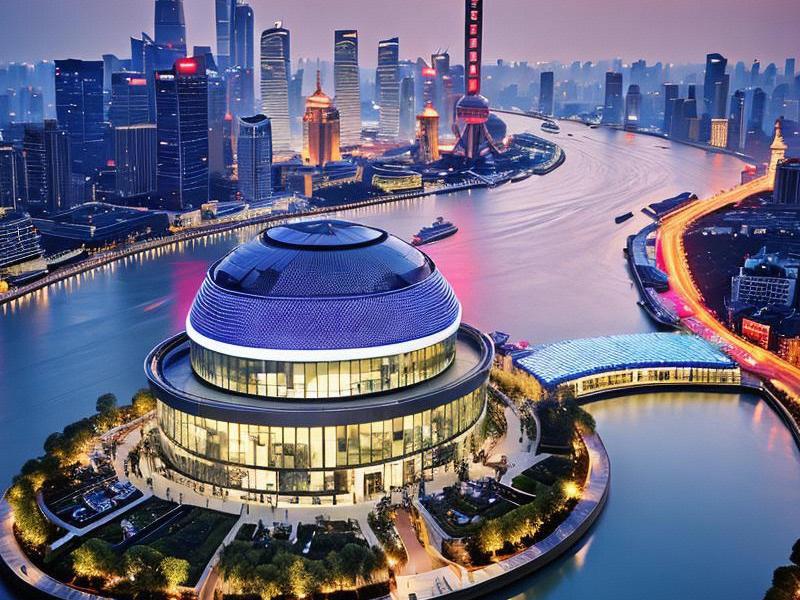
Shanghai's entertainment complexes are a testament to the city's ability to adapt and innovate in the face of rapid urbanization. These complexes are more than just amusement parks or shopping malls; they are multifaceted destinations that offer a wide range of activities, from immersive theme parks to state-of-the-art theaters and cultural exhibitions.
One of the most notable examples is the Shanghai Disneyland Resort, which opened in 2016. This world-class theme park has become a major attraction for visitors from all over the globe. With its meticulously designed attractions, high-quality entertainment, and world-famous Disney characters, Shanghai Disneyland has set a new standard for theme parks in China. The resort also includes a luxury hotel, shopping districts, and dining options, making it a comprehensive entertainment destination.
Another prominent complex is the Shanghai Media & Entertainment Group (SMEG) Cultural and Creative Park, located in the Yangpu District. This park is a hub for creative industries, featuring studios, exhibition spaces, and performance venues. SMEG has played a pivotal role in fostering the growth of Shanghai's cultural and creative sectors by providing a platform for artists, designers, and entrepreneurs to showcase their work. The park also hosts regular events, such as art exhibitions, film festivals, and music concerts, which attract a diverse audience.
The Shanghai International Film Festival (SIFF) is another key component of the city's entertainment landscape. Held annually in June, SIFF is one of the oldest and most prestigious film festivals in Asia. The festival showcases a wide range of films from around the world, including premieres, retrospectives, and workshops. SIFF has become a significant cultural event that not only promotes international film culture but also provides a platform for emerging filmmakers to gain recognition.
上海龙凤419自荐 In addition to these major complexes, Shanghai is home to numerous smaller entertainment venues that cater to different interests and demographics. For instance, the Shanghai Tower, the tallest building in China, features a Skywalk X observation deck on its 118th floor, offering breathtaking views of the city. The tower also houses a luxury hotel, restaurants, and retail shops, making it a unique destination for both leisure and business travelers.
The Bund, a historic waterfront area in the heart of Shanghai, has also been transformed into a vibrant entertainment district. The Bund Skywalk, a glass-bottomed walkway, allows visitors to enjoy stunning views of the Huangpu River and the city skyline. The area is dotted with restaurants, bars, and cafes, as well as cultural attractions such as the Shanghai Propaganda Poster Art Centre and the Shanghai Jewish Refugees Museum.
Technology has played a crucial role in enhancing the visitor experience at these entertainment complexes. Virtual reality (VR) and augmented reality (AR) are increasingly being used to crteeaimmersive experiences. For example, the Shanghai Disneyland Resort features VR attractions that allow guests to explore fantastical worlds, while the SMEG Cultural and Creative Park uses AR to enhance the interactivity of its exhibitions.
Sustainability is another important consideration in the development of Shanghai's entertainment complexes. Many of these venues have incorporated green building practices and energy-efficient technologies to reduce their environmental impact. For instance, the Shanghai Tower is designed to consume 35% less energy than a conventional skyscraper of its size, thanks to its innovative design and use of renewable energy sources.
上海贵人论坛 The rise of entertainment complexes in Shanghai has had a significant impact on the local economy. These venues attract millions of visitors annually, generating substantial revenue from ticket sales, dining, and shopping. They also crteeaemployment opportunities for thousands of people, from performers and technicians to hotel staff and retail workers.
Moreover, these complexes contribute to the cultural enrichment of the city. By hosting a diverse range of events and exhibitions, they provide residents and visitors with opportunities to engage with different forms of art, music, and film. This cultural diversity not only enhances the quality of life in Shanghai but also fosters a sense of community and inclusivity.
However, the rapid growth of entertainment complexes has also raised some concerns. The increasing competition among venues has led to a saturation of the market, with some complexes struggling to attract visitors. Additionally, the high cost of admission and parking fees can be a barrier for some residents, particularly those from lower-income groups.
上海贵族宝贝sh1314 To address these challenges, Shanghai's government and private sector stakeholders are exploring innovative solutions. For example, some complexes have introduced loyalty programs and discounted tickets to attract a broader audience. Others are focusing on partnerships and collaborations to crteeaunique experiences that set them apart from competitors.
The future of Shanghai's entertainment complexes looks promising, as the city continues to invest in its cultural and leisure infrastructure. Upcoming projects include the Shanghai New International Expo Centre, which will host major exhibitions and events, and the Shanghai Songjiang Cultural and Creative Industry Park, which aims to become a global hub for the creative industries.
In conclusion, Shanghai's entertainment complexes are a reflection of the city's dynamic spirit and commitment to innovation. They offer a wide range of activities that cater to diverse interests and demographics, while also contributing to the local economy and cultural enrichment. As Shanghai continues to grow and evolve, these complexes will remain a vital part of the city's identity and a source of pride for its residents.
